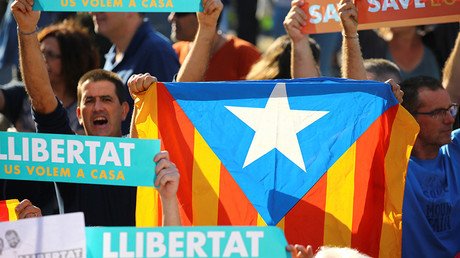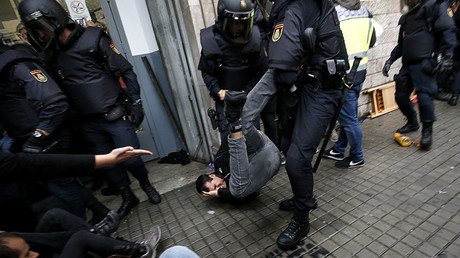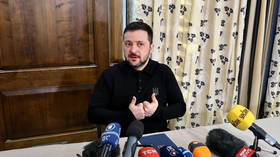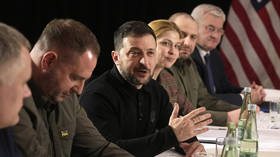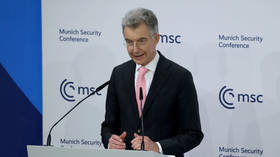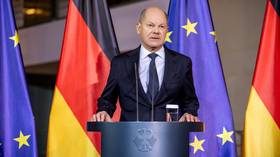Catalan crisis escalated by repressive actions of Spanish government – analysts
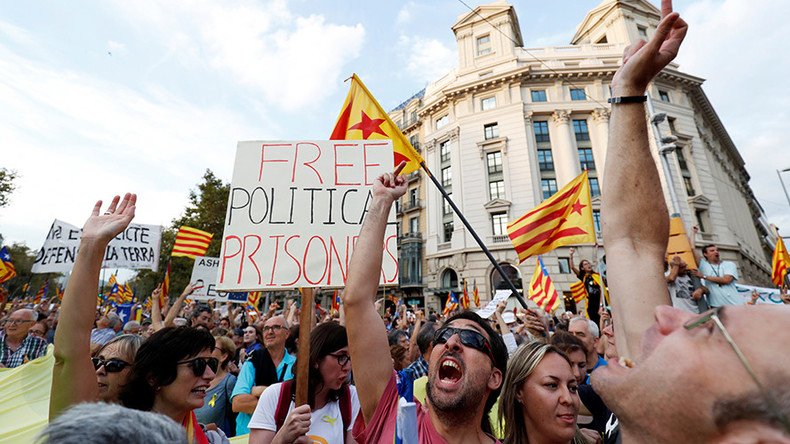
The crisis over Catalonia’s independence, which could have been avoided through negotiations, was escalated by the repressive actions of a Spanish government that doesn’t seem eager to change its ways, analysts say.
With tensions mounting in Catalonia, analysts blame Madrid for the escalation of the conflict and an unwillingness to negotiate.
“I don’t think it’s a place that anyone wants to see go up in flames or to have tanks in the streets… What is so terrible about this whole thing is that it could have been easily resolved through negotiations,”Thomas Harrington, professor of Iberian studies at Hartford’s Trinity College, told RT.
He believes that the current turn of events was caused by “the residual mentality of a Francoist dictatorship that thinks in terms of authoritarian solutions.”
Prime Minister Mariano Rajoy and his government “want to hegemonize Spain and have a situation where they can always have the upper hand if needed,” he said. “It kind of makes a mockery of the idea of the famous ‘Spanish transition to democracy’ [after the death of military dictator Francisco Franco in 1975]. We’re seeing now that the attitudes didn’t at all change and that when you get into trouble, you apply force – at least, from Madrid’s point of view.”
Despite Madrid dissolving the Catalan government and ordering snap elections to the local parliament, the vote in the region is unlikely to happen, Harrington said.
“It is hard to imagine who is going to participate” in the election, which the central government wants in Catalonia, he explained.
Catalan government spokesman, Jordi Turull, told RAC1 broadcaster on Saturday that “holding an election is not under discussion,” no matter the orders from Madrid.
READ MORE: 'It’s a coup': Thousands protest power transfer from Barcelona to Madrid (VIDEO, PHOTO)
Bernard Daelemans, who was an observer during the Catalan independence referendum on October 1, told RT that the Spanish authorities had been “acting only in repressive ways” even before the plebiscite.
“They arrested civil servants of the Catalonian government weeks before the referendum took place. They have been threatening with prison and with fines all the mayors that wanted to organize this referendum.”
But the “real shock” was the police violence on the day of referendum, which was “really rude, brutal and not proportionate towards this pacific process that Catalans were displaying in their towns and villages,” said Daelemans, who is a board member of the International Commission of European Citizens.
Over 800 people, including women and the elderly, were injured in Barcelona and elsewhere in the region as the Spanish authorities attempted to prevent the Catalans from casting their votes.
Following the plebiscite, in which 90 percent supported cutting ties with Madrid, the Spanish government kept reaffirming the opinion “that it knows only one language – the language of repression, fining, arresting people, and now even several [figures from] civil society, who are not even political elected persons, have been put in jail,” said Daelemans, referring to the detained independence activists Jordi Cuixart and Jordi Sanchez.
“Independence is, of course, something, which is mostly not foreseen in the constitution. But there is also something like the will of the people and the right of self-determination that is a human right, and that should be recognized not only by Spain, but also by European institutions.”
Daelemans said that the EU reaction to the crisis in Catalonia has also been “disappointing,” as Brussels opted to side with Madrid over the issue.
“[The EU] have been backing the Spanish government – first on October 10, when the Catalan Prime Minister (Carles Puigdemont) was about to declare independence, (European Council president) Donald Tusk begged him to make a gesture of goodwill and Puigdemont did – he suspended the declaration of independence, so it would open a possibility of talks. But now the same Donald Tusk is just saying that Spain is [fine] to follow its repressive [course of action]. I think they are making a big, big mistake.”
